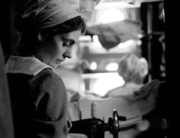In August 1972, John Wojtowicz robbed a bank in Brooklyn, taking hostages and enduring a 13-hour standoff with the police. The unsuccessful heist granted Wojtowicz 15 minutes of fame, which he tried to spread over a lifetime. The classic Sidney Lumet film Dog Day Afternoon (1975) was inspired by his actions, but The Dog, which details his life before and after that fateful day, has enough tricks up its sleeve to fascinate those who’ve never heard of the story and those who think they’ve heard it all.
Wojtowicz, who is his own biggest fan, is a self-professed pervert. He doesn’t drink, smoke, take drugs, or gamble, so he feels no shame in allowing himself a single indulgence: sex. A Vietnam veteran, his first homosexual experience was initiated in basic training by a “hillbilly” named Wilbur. Upon returning home—after a tour of duty which turned him from a Goldwater conservative to a McCarthy liberal—he married his sweetheart, Carmen, and started a family. However, settling down was not in the cards. Wojtowicz engaged on a sexual career which would eventually incorporate, in his own words, four wives and 23 girlfriends. “They all know each other,” he says, shrugging. “You can love more than one person.”
It would spoil some of Dog Day’s fun to describe what exactly led him to enter the Chase Bank on that hot summer afternoon, but it may suffice to say that some of Wojtowicz’s marriages were concurrent, and not all of his partners were equally sane. He would likely say it was love that pushed him through the bank’s door with a gun inside a giant Wrigley’s gum box, but one isn’t sure how seriously to take Wojtowicz’s romantic impulses.
His status as a civil rights icon is similarly unclear. Leaving his first wife—and children—he experienced a new sexual awakening just days before the Stonewall riots, and he staged a gay wedding (attended by his traditional Italian mother, no less) at a time when such a thing was largely unheard of. The entire robbery episode was “gay liberation right down your throat,” according to one observer, and his post-robbery treatment by the police led at least one journalist to conclude he was being discriminated against. Yet the gay activist community felt divided, with a majority choosing to write him off as an unstable attention-seeker. “I’m the gay Babe Ruth,” he maintains, unfazed. Nothing can keep him down, including the brutal rapes in prison.
Nor can anything keep him from seeing his life the way he wants to see it. Throughout, the directors have left in little moments where Wojtowicz calls out “cut” and other directions in a playful attempt to control his own biography. With similar shrewdness, Berg and Keraudren structure the film in a way that allows the gravity of this history to sneak up on the viewer. His crime was “no laughing matter,” says a hostage, looking back.
Further, his former psychologist offers troubling thoughts on the situation, adding more complexities and surprises than can be contained in one review. So as we watch Wojtowicz waste away over the course of filming, we are left to wonder if he is the self-actualized hero he proclaims to be or a stunted human being.
Thousands of New Yorkers crowded outside the original crime scene to watch the standoff. They came out of boredom and out of that semi-shadowy impulse that keeps us gossiping and rubbernecking. Dog Day Afternoon turned that tabloid fare into art by masterfully rendering a conflicted protagonist at the heart of it. The Dog is a worthy companion piece, revealing the life of the antihero who started it all.







Leave A Comment